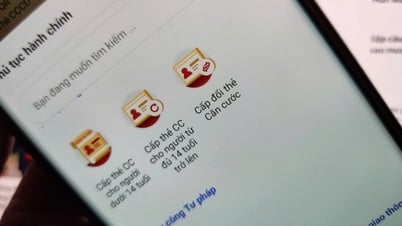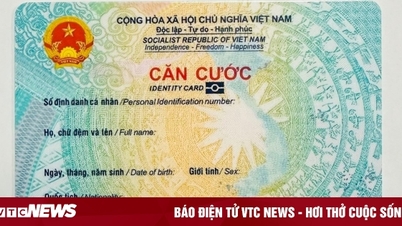The Law on Identification was passed by the 15th National Assembly at its 6th session, effective from July 1, 2024. One of the important contents of the law is the conversion of CCCD cards into ID cards.
According to the proposal from the Ministry of Public Security , the ID card is not just a name change, it also has many new features compared to the CCCD card. For example, the "hometown" section will be changed to "place of birth registration", "place of permanent residence" will be changed to "place of residence", on the ID card there will no longer be information about identification features, fingerprints of the left index finger and right index finger...
By the end of 2023, the Ministry of Public Security had issued more than 83 million chip-embedded CCCD cards to people nationwide. After the ID Law was passed, many people wondered whether these more than 83 million CCCD cards had to be exchanged for ID cards or not?
Regarding this issue, in the transitional provisions, the Law on Identification clearly stipulates that CCCD cards issued before July 1, 2024 will be valid until the expiry date printed on the card. Thus, if you already have a CCCD card with a chip (and it is still valid), there is no need to change to an ID card.
Cases requiring conversion to ID card include:
-Citizens aged 14, 25, 40 and 60
Previously, the 2014 Citizen Identification Law No. 59/2014/QH13 only stipulated that citizens at the ages of 25, 40, and 60 needed to make a CCCD.
However, starting from July 1, 2024, citizens who are 14 years old and have been issued an ID card before are required to carry out procedures to issue and renew their ID card. For those under 14 years old, it is not required to do so, but an ID card will only be issued when needed.
- Change, correct information about last name, middle name, birth name; date of birth
Information such as full name and date of birth are important information of a citizen. Therefore, when there is a change, updating the above information in the ID card is mandatory to ensure the accuracy of personal data, avoiding confusion and disputes when making transactions.
- Change identity; add information about facial photo, fingerprints; re-identify gender or change gender according to the law
Compared to the 2014 Citizen Identification Law, in Article 24 of the new 2023 Citizen Identification Law, citizens who change their gender will also need to change their ID card from July 1, 2024. At the same time, identity, face, and fingerprints are among the unique characteristics to identify different individuals.
Therefore, when changing identity, face, fingerprints or gender, updating the above data is extremely important to facilitate the authorities to confirm information when necessary.
-There is an error in the information printed on the ID card.
Currently, the ID card includes the following information stated in Article 18 of the ID Law: Facial photo; Personal identification number; Surname, middle name and given name; Date of birth; Gender; Place of birth registration; Nationality; Place of residence.
This is also important information to distinguish one individual from another. Therefore, when discovering incorrect information on the ID card, people need to go to the police agency to immediately change to a new card.
-Reset personal identification number
According to Clause 3, Article 12 of the Law on Identification, personal identification numbers are used to carry out procedures for issuing ID cards. In addition, at the 6th session of the 15th National Assembly, the Ministry of Public Security stipulated that citizens can cancel and re-establish their personal identification numbers when:
Re-determine gender/correct year of birth.
Errors in personal information such as: year of birth, gender, place of birth registration.
Therefore, when re-establishing personal identification number, citizens need to re-issue ID card to correspond with the new personal identification number.
Currently, the personal identification number is a series of 12 numbers including:
First 6 digits: century code, gender code, year of birth code, province code, centrally run city/country code where birth is registered.
The remaining 6 numbers are random (Pursuant to Article 13 of Decree 137/2015/ND-CP).
It can be seen that incorrect information about year of birth, gender, and place of birth registration will also affect the first 6 digits of the personal identification number.
- CCCD cards with chips that expire after July 1, 2024 (the expiration date is printed on the front, bottom left corner of the card), must be changed to ID cards.
In addition, people can apply for an ID card (upon request) in the following cases:
- Vietnamese citizens under 14 years old, carry out the procedure for issuing an ID card for the first time, through a representative. This is a new regulation in the ID Law compared to the CCCD Law, aiming to expand the subjects who are issued ID cards.
- Citizens who already have a chip-embedded CCCD card but want to change to an ID card.
- Citizens have changes in personal information, information on ID cards changes due to administrative unit arrangement...
Minh Hoa (t/h)
Source


![[Photo] Hanoi morning of October 1: Prolonged flooding, people wade to work](https://vphoto.vietnam.vn/thumb/1200x675/vietnam/resource/IMAGE/2025/10/1/189be28938e3493fa26b2938efa2059e)





































![[Photo] Panorama of the cable-stayed bridge, the final bottleneck of the Ben Luc-Long Thanh expressway](https://vphoto.vietnam.vn/thumb/1200x675/vietnam/resource/IMAGE/2025/9/30/391fdf21025541d6b2f092e49a17243f)
![[Photo] President Luong Cuong receives President of the Cuban National Assembly Esteban Lazo Hernandez](https://vphoto.vietnam.vn/thumb/1200x675/vietnam/resource/IMAGE/2025/9/30/4d38932911c24f6ea1936252bd5427fa)
![[Photo] The 1st Congress of Phu Tho Provincial Party Committee, term 2025-2030](https://vphoto.vietnam.vn/thumb/1200x675/vietnam/resource/IMAGE/2025/9/30/1507da06216649bba8a1ce6251816820)

























































Comment (0)